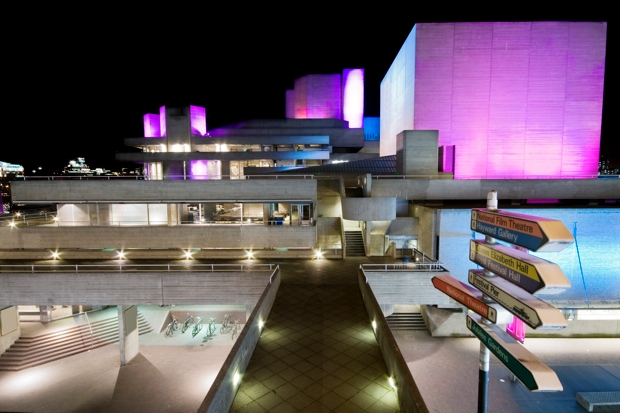In 1976, as the National Theatre moved into its new home on London’s South Bank, its literary manager Kenneth Tynan observed: ‘It’s taken 123 years to get here: 60 of Victorian idealism, half a century of dithering, and a final 13 years in the planning and building.’
Today, still under Nick Hytner’s dynamic and broad-church directorship, the National is in rude health both artistically and economically. But as Daniel Rosenthal makes clear in this magnificently detailed history, published to mark the theatre’s first half-century, the journey has been a supremely hazardous and contentious one.
Right from its Victorian beginnings, the idea of a state-subsided theatre was met with indifference, cynicism and hostility, not least from West End theatre managers and actors: Charles Wyndham called it ‘alien to the spirit of our nation’, while Seymour Hicks wondered ‘if there are really half a dozen people insane enough to think it will ever come into existence’. Even as late as 1961 John Osborne, fearing ‘some kind of awful museum’, declared: ‘If it is ever built I only hope someone sets fire to it.’
Yet the first detailed blueprint for the creation, organisation and management of such a theatre, provided in 1904 by Harley Granville Barker and William Archer, gradually gained support — though only after decades of committee wrangling, continual changes of site and government reluctance to fund it. And when Denys Lasdun’s brutalist concrete building finally rose up by the Thames, it attracted massive public opprobrium; in one poll it was voted the worst building in Britain.
Rosenthal has had full and unfettered access to the National’s extensive archive of letters, memos and board papers, and has interviewed 100 actors, directors, playwrights and administrators over a period of ten years. The result is a full and fascinating account of the contrasting regimes of the theatre’s first five directors: Laurence Olivier, Peter Hall, Richard Eyre, Trevor Nunn and Nicholas Hytner.
Each had to confront similar challenges in the perennial battle between art and money: how to stage new, often experimental plays while balancing the books; whether to create an ensemble company or make use of the star system; how to attract new audiences beyond the traditional middle-class one; how to keep the theatre open for business in the face of government cuts.
The stress was predictably enormous. Olivier saw the job as ‘the most tiresome, awkward, embarrassing, forever-compromise, never-right, thankless fucking post that anyone could be fool enough to take on’. For Nunn it was like ‘juggling plates, while riding a unicycle, on a tightrope, over Niagara Falls’, while Eyre suggested that ‘the combination of doing productions and attempting to be thoroughly on the case in every area is a one-way ticket to the madhouse.’
At the Old Vic, the National’s temporary home in the early years, Olivier created and headed a scintillating company, which included Maggie Smith, Michael Redgrave, Joan Plowright and Tom Courtenay, as well as emerging stars such as Derek Jacobi, Michael Gambon, Lynn Redgrave and Robert Stephens. But his tenure was beset with problems, not least his own debilitating illness, and his volatile relationship with Tynan, who favoured more challenging plays that reflected matters of public debate. Olivier also had to contend with censorship, at the hands both of the Lord Chamberlain and his own board; the latter was reflected in his battle to stage Rolf Hochhuth’s controversial play Soldiers, with its potential libel of Winston Churchill.
His successor Peter Hall’s great achievement was to oversee the transfer to the South Bank, and then just to keep the new building open: his battles with recalcitrant builders and striking trade unions would have crushed a less resilient and courageous man. He was undoubtedly a great impresario, a fine inspirer of talent and a combative spokesman for the theatre in general. But his later years were overshadowed by his rash decision to take on other commitments at Glyndbourne and elsewhere, apparently putting his desire to make money before the needs of the National. Interestingly, he denies this charge today, telling Rosenthal: ‘I certainly knew if I was selling the National short, and I don’t believe I was.’
Like Hall, Richard Eyre had a passion for new writing, and was also responsible for bringing in black and Asian actors and giving greater opportunities to women directors. Yet, ironically, it was staging the musicals Guys and Dolls and A Little Night Music that enabled him to overcome the worst box-office slump in the National’s history. As a leader he was clearly much loved and admired, but often felt insecure about his own abilities as a director.
By contrast, Trevor Nunn’s undoubted brilliance as a director led to accusations that he ‘escaped’ too often into the rehearsal room. This was to the obvious detriment of his managerial role, in which he proved frustratingly slow to make decisions. His policy of staging musicals was financially successful, but was lambasted by many critics for betraying the basic principles of the National.
Nick Hytner’s reign, now nearing its close, has been remarkable for its audience-expanding cheap-ticket scheme, and for the opening up of the National to a greater range of innovative companies, such as Kneehigh and Improbable Theatre. A bold, radical reformer, Hytner has also introduced Sunday opening and NT Live, which now brings the National’s productions within the reach of cinemagoers worldwide.
Throughout the book Rosenthal describes with admirable lucidity and fairness the many dramas and crises, providing a variety of opinion and perspective from the main players, both now and at the time. Occasionally, as with Tony Kushner’s Angels in America and David Hare’s Stuff Happens, he gives too much space to plot detail. He also pays scant regard to the important and visionary work with schools and youth groups of Jenny Harris and her education department.
But these are minor flaws in this meticulously researched book, which provides a uniquely revealing story of life within a great cultural institution.






Comments